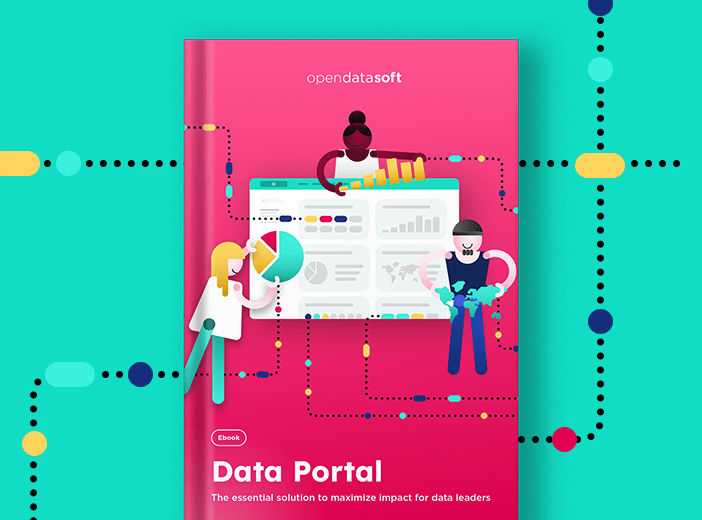Data portals: The essential step to building an external data ecosystem

Extending data sharing across entire ecosystems drives transformative benefits in terms of efficiency, collaboration and innovation. While a new concept to many organizations, pioneers are already seeing the advantages of building external data ecosystems - we explore the foundations required, starting with intuitive, centralized data portals.
The more people that have access to data, the greater the value it delivers. That’s the key benefit of data democratization, with wider data sharing providing advantages to businesses, public sector organizations, citizens, employees and customers. This is particularly true when it comes to sharing data with third parties, such as partners and across ecosystems. This process requires a combination of technology, such as data portal software, culture and trust.
The benefits of external data sharing for organizations
Many organizations already share their data through open data portals. These deliver key benefits by providing greater transparency that increases engagement and collaboration with stakeholders. External data sharing via partner portals takes this approach a step further, sharing specific, focused data assets with companies within the ecosystem. This enables companies and public sector organizations to:
- Launch new data sharing services, either delivered free or charged for, potentially creating additional revenue streams from their data
- Meet regulatory requirements, such as those within the EU Data Act and around the reporting of sustainability performance
- Access new data from partners to train artificial intelligence (AI) algorithms in order to improve the accuracy and performance of AI Large Language Models (LLMs)
The power of external data ecosystems
External data sharing platforms enable greater collaboration across end-to-end supply chains and underpins innovation and transparency, benefiting everyone involved. It helps meet key global mega challenges and drive efficiency and innovation. Examples include:
- Sharing information between partners to measure the total carbon footprint of products and activities (Scope 3 emissions) in order to monitor, improve and meet sustainability goals for companies in all sectors
- Ensuring supply chains are robust through data sharing, helping track shipments and orders from production to delivery, especially in industries such as manufacturing and retail
- Balancing energy supply and demand across energy networks, enabling the integration of renewable generators and prosumers into energy grids
- Collecting and sharing health data between patients, doctors, hospitals and pharmaceutical companies to deliver better patient outcomes and enable research into diseases
Building an effective external data ecosystem
There are three essential components required to share data across ecosystems – robust, intuitive technology, a sharing culture, and trust between partners.
Underpin sharing with intuitive data portal technology
To be useful to partners, data needs to be reliable, high-quality and interoperable with their own systems. They need to be able to discover and access it seamlessly through data portals and then use it effectively either by downloading it in common formats (such as CSV or Excel) or by automating data flows via APIs.
Whether hosted by one company or designed as a neutral space run by a consortium or industry body, partner data portals provide the ability to give specific access to certain datasets and assets that deliver value. Through them, partners can find, access and use data, as well as connect their own data sources to contribute information. This interoperability between everyone is particularly vital as companies within an ecosystem will have a range of tech stacks and data architectures in place, and will have different levels of data maturity. For example, some organizations may be smaller, with a less developed technology infrastructure compared to larger, better resourced partners. Everyone has to have equal access to data, whatever their size or position in the ecosystem.
Ensuring data quality requires organizations to put in place strong data governance processes internally, and focus on meeting agreed, ecosystem-wide standards for how data is structured and described through metadata. Again, data sharing software can help here, applying in-built processors to standardize incoming data sets, for example, ensuring that data and time formats are all in the ISO 8601 standard.
Develop a ecosystem-wide data sharing culture
Becoming data-driven requires cultural change, inside organizations themselves and across wider ecosystems. Senior management and employees all need to commit to the greater openness and transparency that data sharing brings, and understand the benefits that data democratization delivers in terms of efficiency, collaboration and innovation. Everyone needs to learn to embrace data-driven decision making, rather than relying on intuition or gut feel.
It is vital that participants take an ecosystem-level view. For example, sharing their data may not bring immediate benefits to them, but enable innovation or improvements by other parts of the ecosystem. Ultimately, this helps everyone, such as in the case of decarbonization, but can require players to be altruistic earlier in the process to contribute to the greater good.
Find ways of creating trust across the ecosystem
Data ecosystems can bring together companies that normally compete. That means that building trust between participants is vital, particularly when it comes to protecting intellectual property and safeguarding competitive information. This needs to be backed up by clear rules, with consequences for anyone that breaks them.
Equally, everyone has to have trust in the data itself. That means ecosystem data portal platforms should have clear explanations of what individual data assets cover and how and where they can be used and reused. To increase reassurance, portals should identify the owners of data assets, and make it easy for them to be contacted with any queries, as well as allowing users to review and rate data assets.
Data ecosystems in action
External data ecosystems are already delivering major benefits across multiple sectors, as these three examples show:
Schneider Electric
Technology and energy automation company Schneider Electric’s key goal is to optimize the use of energy and resources and offer its customers solutions for meeting their challenges around energy efficiency and sustainable development.
As part of this it created the Exchange platform, a subscription-based data services marketplace which brings together resources, including APIs, analytics, datasets and data sharing tools and expertise. The intuitive, Opendatasoft-based portal allows partners to share ideas and concepts through a powerful collaborative cloud platform and access a network of solution providers in the energy sector.
Aix-Marseille-Provence Metropole
The Aix-Marseille-Provence Metropole created its Smart Port project to improve collaboration and efficiency between the various stakeholders of the port of Marseille as part of its wider open data portal platform. Its partner data portal brings together more than a hundred datasets to optimize field operations and increase efficiency, such as by modeling the impact of passenger flows on the planning of container ship sailings. Some companies involved in Smart Port were competitors, and were not accustomed to sharing their data. The implementation of a clear non-disclosure agreement helped to reassure participants, and they then saw how quickly they could benefit from sharing their data, especially when it came to better decision-making.
UK Power Networks
To engage its ecosystem to drive the energy transition, energy company UK Power Networks shares its data via a portal with a wide range of partners, from public authorities/municipalities and energy generators to property developers. To maximize use of its data portal it worked closely with stakeholders to deliver an optimized experience and has created a range of tailored use cases and dashboards to provide them with the information they need. These include visualizations and datasets for local authorities, bringing together all the information they need to plan their energy transition, including over 30 use cases, such as the best places to site new EV charging facilities or network constraints that might impact renewable projects.
As data becomes the lifeblood of every organization, there’s a growing, pressing need to share this information externally across ecosystems to meet key challenges, especially around decarbonization and sustainability. Successfully building data-driven ecosystems benefits all players and the wider community, and requires the right balance of intuitive technology to make data assets available to all via portals, building trust and the right culture to enable data democratization and greater collaboration.
To drive the energy transition, the energy sector is increasingly focused on external data sharing. Find out how it is driving transformation through data at the Energy Data Summit Europe on December 6 in Brussels. Join industry leaders and colleagues from across the European energy sector to gain expert insights, shape your strategy, network and learn best practice.
 Ebook
Ebook
All organizations understand the vital importance of data to success. In a world full of data, easy and rapid access to the right datasets, in the right format, at the right time is crucial to decision-making, efficiency, collaboration, innovation and transparency. It decreases costs, builds new revenue streams, and mitigates risk. This ebook provides a comprehensive introduction to data portals at both a strategic and tactical level. It aims to help you embrace data democratization and unlock the value of your data.

Why do many companies fail to effectively democratize data access? According to new insights from McKinsey it could be due to an overly narrow focus on use cases at the expense of building a scalable data value chain. Our blog explains the key components you need to industrialize data use and unlock greater value.

Successfully harnessing data is at the heart of corporate success, putting the focus on the Chief Data Officer (CDO) to build data-centric organizations. However, CDOs face a wide range of challenges to achieving success. Our blog explains how implementing one-stop-shop data portals helps CDOs demonstrate value, unlock fresh resources and build for the future.

